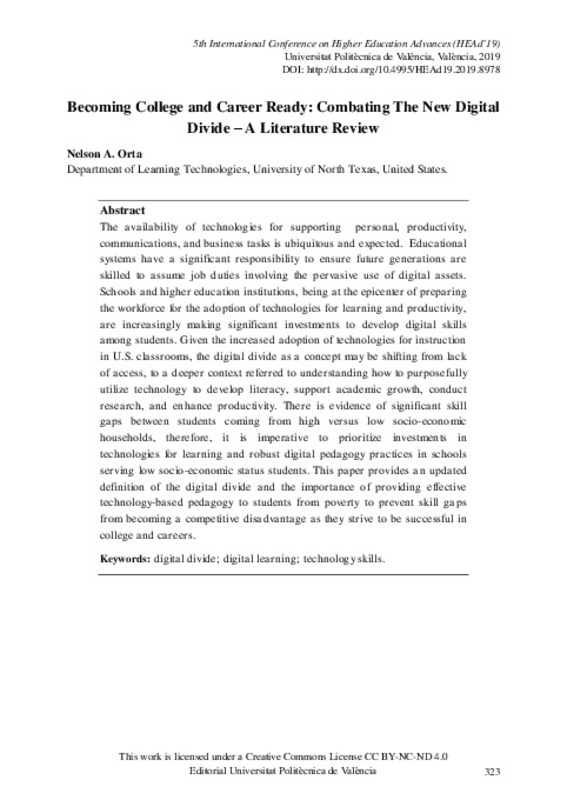JavaScript is disabled for your browser. Some features of this site may not work without it.
Buscar en RiuNet
Listar
Mi cuenta
Estadísticas
Ayuda RiuNet
Admin. UPV
Becoming College and Career Ready: Combating The New Digital Divide – A Literature Review
Mostrar el registro sencillo del ítem
Ficheros en el ítem
| dc.contributor.author | Orta, Nelson
|
es_ES |
| dc.date.accessioned | 2019-07-18T06:53:24Z | |
| dc.date.available | 2019-07-18T06:53:24Z | |
| dc.date.issued | 2019-07-05 | |
| dc.identifier.isbn | 9788490486610 | |
| dc.identifier.issn | 2603-5871 | |
| dc.identifier.uri | http://hdl.handle.net/10251/123742 | |
| dc.description.abstract | [EN] The availability of technologies for supporting personal, productivity, communications, and business tasks is ubiquitous and expected. Educational systems have a significant responsibility to ensure future generations are skilled to assume job duties involving the pervasive use of digital assets. Schools and higher education institutions, being at the epicenter of preparing the workforce for the adoption of technologies for learning and productivity, are increasingly making significant investments to develop digital skills among students. Given the increased adoption of technologies for instruction in U.S. classrooms, the digital divide as a concept may be shifting from lack of access, to a deeper context referred to understanding how to purposefully utilize technology to develop literacy, support academic growth, conduct research, and enhance productivity. There is evidence of significant skill gaps between students coming from high versus low socio-economic households, therefore, it is imperative to prioritize investments in technologies for learning and robust digital pedagogy practices in schools serving low socio-economic status students. This paper provides an updated definition of the digital divide and the importance of providing effective technology-based pedagogy to students from poverty to prevent skill gaps from becoming a competitive disadvantage as they strive to be successful in college and careers. | es_ES |
| dc.format.extent | 8 | es_ES |
| dc.language | Inglés | es_ES |
| dc.publisher | Editorial Universitat Politècnica de València | es_ES |
| dc.relation.ispartof | HEAD'19. 5th International Conference on Higher Education Advances | es_ES |
| dc.rights | Reconocimiento - No comercial - Sin obra derivada (by-nc-nd) | es_ES |
| dc.subject | Higher Education | es_ES |
| dc.subject | Learning | es_ES |
| dc.subject | Educational systems | es_ES |
| dc.subject | Teaching | es_ES |
| dc.subject | Digital divide | es_ES |
| dc.subject | Digital learning | es_ES |
| dc.subject | Technology skills | es_ES |
| dc.title | Becoming College and Career Ready: Combating The New Digital Divide – A Literature Review | es_ES |
| dc.type | Capítulo de libro | es_ES |
| dc.type | Comunicación en congreso | es_ES |
| dc.identifier.doi | 10.4995/HEAD19.2019.8978 | |
| dc.rights.accessRights | Abierto | es_ES |
| dc.description.bibliographicCitation | Orta, N. (2019). Becoming College and Career Ready: Combating The New Digital Divide – A Literature Review. En HEAD'19. 5th International Conference on Higher Education Advances. Editorial Universitat Politècnica de València. 323-330. https://doi.org/10.4995/HEAD19.2019.8978 | es_ES |
| dc.description.accrualMethod | OCS | es_ES |
| dc.relation.conferencename | Fifth International Conference on Higher Education Advances | es_ES |
| dc.relation.conferencedate | Junio 26-28, 2019 | es_ES |
| dc.relation.conferenceplace | València, Spain | es_ES |
| dc.relation.publisherversion | http://ocs.editorial.upv.es/index.php/HEAD/HEAD19/paper/view/8978 | es_ES |
| dc.description.upvformatpinicio | 323 | es_ES |
| dc.description.upvformatpfin | 330 | es_ES |
| dc.type.version | info:eu-repo/semantics/publishedVersion | es_ES |
| dc.relation.pasarela | OCS\8978 | es_ES |








